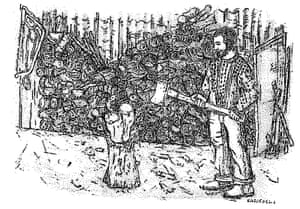
We are walking eyes half-open, half-asleep into a techno-dystopia even George Orwell couldn’t imagine. 1984 is starting to look primitive compared to what’s in store for us. Sex robots could soon make deep, intimate relationships with other people a thing of the past, in the same way machines have made obsolete a deep intimate relationship with the natural world. Why bother with all the messy, complicated beauty of life when you can have the sterile predictability of a machine?
I did an interview recently for a programme exploring digital privacy and the future of technology. Not having a television or internet, I didn’t see it myself, but I was told that the programme’s revelations were astounding. They spoke to me about my experiences living without tech, and one of the first questions the presenter asked was: “Do you not get really bored?” I laughed, but it’s a question I get asked a lot.
Boredom – like loneliness, ecological illiteracy, the selfie, depression – is one of the more recent pandemics in mankind’s all-conquering march forward. Scientists are, of course, working on cures as we speak, but in the meantime symptoms can be treated with a tablet taken morning, noon and night. Prices start from £149.99 (WARNING: side effects may include: addiction, mass extinction of species, community breakdown and relationship problems).
The good news is that unbeknownst to those in white coats, there already is a cure. Every wild creature knows it. Every tribal people knows it. Every time we leave our manicured, pseudo-comfortable surroundings and take off somewhere wilder we get a taste of this cure, and feel refreshed and rejuvenated for it. But most of the time we’re suffering from an acute case of what George Monbiot, in his book Feral, diagnoses as ecological boredom.
We’re spending more time feeling ecologically bored in cities, and less in wild places, for a few reasons. Because of industrialism’s need for scale and capitalism’s growth imperative, there’s less of anything resembling the natural world left. The pressures of our politico-economic system and culture mean we’re often too busy paying our relentless bills to get out into it. And because we’re bombarded with increasing doses of glamour, glitz, buzz, celebrity, hype, and excitement, we initially find the natural world mundane, in the same way research shows that men who watch lots of online pornography often struggle to then have fulfilling sexual relationships with living, breathing women; who, rather strangely, prefer intimacy and emotional connection to competing in the sexual Olympics.

Again there’s good news: there is a cure, but one which needs action. Visionary organisations such as the Cambrian Wildwood Project are working on transforming denuded, monocultural areas into biodiverse, rewilded landscapes through the creation of woodland, wildlife corridors and the reintroduction of species. Not only does it create much-needed habitat for a wide range of species, we also get wild places where we can go and get lost. It’s some of the most important work of our time, and we would be wise to support these projects as if our lives depended on them.
Back to that interview. To that presenter’s surprise, I told her that getting rid of my phone, laptop, internet and suchlike has left me far from bored. As I said in my last article, living in this way means the same things take longer, but that’s only a small part of the answer. By giving up tech I’ve started to make space to do things I’ve been wanting to do for years.
People often ask me what I do without tech. I find the question more interesting than the answer, but it’s a thousand little things. No two days are the same. Let’s take the last few: using windfallen, roundwood poles I gathered from the woods, I built a smokehouse which I’ll use to preserve trout and venison, as I don’t have a fridge or freezer. (I’ll store the extra meat in the bellies of my neighbours).
Another day I made a paddock out of spruce for the horses, who will pull a cart for wood and get us from one place to the next in no particular hurry. Having finished laying a flatstone path to the cabin one morning, I spent the afternoon working a buckskin which, one day, I’ll turn into clothes or something else useful. The sinews will be the thread.
At any given moment there’s a long list of things I’d love to be doing. Like taking off early in the morning to go fishing for the evening’s supper. Bringing the neighbour’s dog for a walk as I forage the hedgerows and verges for lunch – navelwort, sorrel, ramsons – while picking gorse flowers for the summer’s wine. Gathering and chopping wood is always more of a practical meditation than a chore. I want everything we use in the cabin to be hand-crafted, and to that purpose I’d love to spend my evenings whittling spoons and utensils by the fire.
If a bored moment ever did arise, I’ve a tin whistle begging to be learned, and a pile of books I’m always wanting to read. My girlfriend would like nothing better than to take to the road with the horses for an adventure, stopping of at a lake for a wash and a swim. There was a time when I would have thought of such things as fanciful and unproductive, but if you keep your material needs simple, what’s the point of constantly being productive anyway?
Of course, as in any way of life, there are jobs that you would prefer not to do. I don’t want to glorify it, as it has its own struggles, especially in the digital age. Washing clothes by hand, before drying them with a mangle, is never an exciting task. I’m not going to pretend that working on wet days in the mud is always a joy. Yet I still find such jobs important, and, with the odd exception, I find that work, life and play merge into one.
Giving up tech for most people may not be either desirable or practically possible. But as Thoreau once said: “I trust that none will stretch the seams in putting on the coat, for it may do good service to him whom it fits.” To those for whom it may fit, try minimising your use of tech first and spending the time you save doing something else you’ve been wanting to do for a while. See which feels better, healthier, more rewarding.
We need to stop and question the ever-encroaching invasion of tech in our lives. Otherwise, some morning in 10 years’ time, we could wake up in a bed next to a sex robot, and by then it will feel as normal as staring into a screen all day while the sun shines invitingly outside.
• This article was written by hand and posted to an editor at the Guardian, who typed it up to go online. Get in touch with Mark Boyle here or in the comments below, a selection of which will be posted to him.
The fee for this article has been donated to the Cambrian Wildwood Project.
[“Source-theguardian”]














